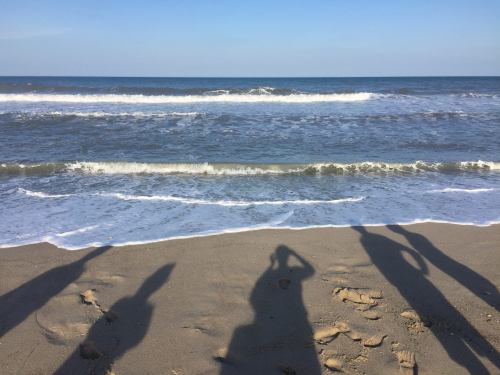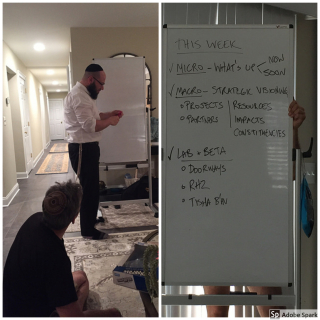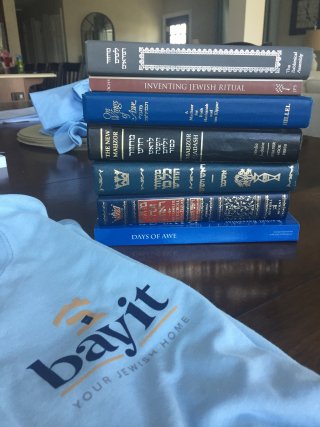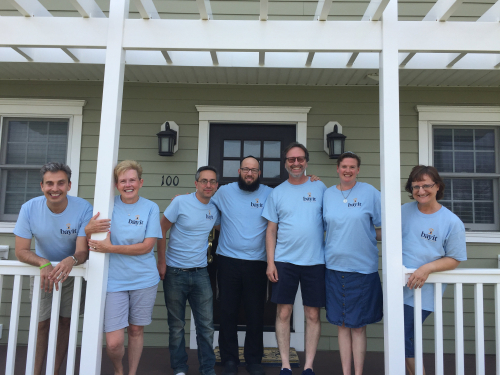Rachel Barenblat's Blog, page 72
July 17, 2018
Fresh air
In 1877, The Fresh Air Fund, an independent not-for-profit organization, was created with one simple mission – to allow children living in low-income communities to enjoy free summer experiences in the country. [Source]
Back when the Fresh Air Fund was started, tuberculosis was a serious danger, and fresh air was understood to be restorative. We have other ways of treating TB now, but the Fresh Air Fund is still sending low-income city kids to the country. Their mission -- "getting children out of the city and into fresh air where they [can] play freely and not worry about the grinding pressures of hunger, crime, and poverty – remains unchanged." [Source]
Some months ago, the local Fresh Air Fund representative contacted me to see if I would share a flyer with the synagogue community. The place where I live is part of their Friendly Towns Program, and I have congregants who have hosted Fresh Air Fund kids in years past. Of course I agreed to share their materials with my shul community. And I thought, "Wow: wouldn't it be great for my kid if we served as a host family?"
I ran the idea by my kid, and he agreed enthusiastically to the idea of hosting. My ex and his partner and I filled out the paperwork, underwent the requisite background check, and waited. Finally we learned that we'd been matched with a boy a year younger than ours. And this week we are a Fresh Air Fund host family, in our two households, introducing a city kid to life in northern Berkshire (and southern Vermont, where he is joining my son at day camp for the week.)
When I ran the idea by my kid all those months ago, I think he was mostly excited about the prospect of having a playmate. We talked about how it's a mitzvah (a commandment, a core part of Jewish life and practice) to be generous and hospitable, and to share what we have with those who have less, but I'm not sure how much that really penetrated his consciousness.
I don't think my son realizes how fortunate we are. He has not one but two homes: his father's house and mine. He has summer camp opportunities, and a condo pool, and pretty much all the LEGOs a kid could want, and great expanses of back yard and woods to run around in. I want him to learn that it's our job to share our abundance. One way we try to do that is that half of his allowance each week goes to tzedakah. Another way we're trying to do that is inviting someone who doesn't have all of those opportunities to share for a week in the bounty we enjoy.
And... while I know I just said we're sharing our abundance, we also can't position ourselves as the generous hosts who "have" and are sharing with those who "have not." These boys both have things to teach each other and to learn from each other. In a way, this is a cultural exchange program both for the city kid who comes here, and for the country kid who hosts him.
As our first Fresh Air Fund week unfolds, I think both boys are learning a lot. Our visitor speaks Chinese on the phone home with his parents, while my son's vocabulary is sprinkled with Hebrew words. My son marvels that his new buddy walks to school and to the grocery store and takes the subway all the time -- those are city norms that are unfamiliar to my small-town kid. Meanwhile, his new friend had never swum in a pond or a stream before, and finds it strange that we have to drive to get anywhere other than our mailbox and the condo pool.
Welcoming an unfamiliar kid into the household is a learning experience for all of us. It's an opportunity for my son to learn how to be a gracious host, which is an important mitzvah though not always an easy one. Sharing one's stuff with another kid is hard, especially when that other kid is a stranger, especially when you may not easily be able to find common ground. I'm learning how to moderate the two boys' needs, taking into account the fact that one of them is a visitor far from home and the other is my own kid whose wants and needs I know well.
I'm grateful that we're doing this -- and I'm grateful not despite the challenges, but in part precisely because of them. I think my son is growing a lot this week, and I suspect that as I grapple with the challenges of parenting (or serving in loco parentis for) two very different kids, I'm growing too. And I'm happy that we're able to give this city kid a week's worth of country adventures: frog ponds and campfires, swim dates and streams, evening popsicles on our mirpesset under the wide open small-town sky.
Deep gratitude to Camp Sarsaparilla in Pownal, VT, which offers scholarships each week for Fresh Air Fund kids.

July 16, 2018
Seven energies, seven weeks, coming soon
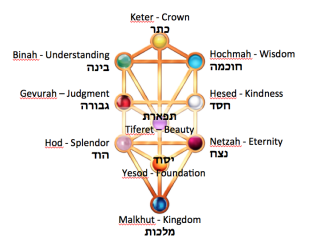 Seven is a special number in Judaism. Seven are the days of the week (six days of creation + Shabbat). In many Jewish weddings, the partners circle each other seven times. We make seven stops when carrying a casket to the grave. Seven are the colors of the rainbow.
Seven is a special number in Judaism. Seven are the days of the week (six days of creation + Shabbat). In many Jewish weddings, the partners circle each other seven times. We make seven stops when carrying a casket to the grave. Seven are the colors of the rainbow.
We count the Omer for seven weeks between Pesach and Shavuot, and some of us do a reverse Omer count during the seven weeks between Tisha b'Av and Rosh Hashanah. And all of these sevens can be echoes, or reminders, of the seven energetic qualities that our mystics find in divinity (and in us.)
Our mystics understand God to be both transcendent (infinite, beyond our grasp) and immanent (reachable / relatable / embodied in creation). They envisioned a map of ten divine qualities or energies (called sefirot) through which God's infinity flows into finite creation.
You might imagine the sefirot as electrical transformers that enable the energy of divine infinity to "step down" and modulate to a level that's graspable in physical creation. Sometimes these ten qualities are depicted as nodes in a map of energy-flow. Sometimes they're depicted superimposed over an image of a tree, or over an image of a human being.
At the "top" of the map is Ein Sof -- "Without End," limitlessness, infinity. ("Top" and "bottom" are metaphors for something that's not actually spatial at all, but we use a spatial metaphor to help us imagine this.) The "upper" three sefirot are usually considered so lofty that we can't reach them. (Different schools conceptualize the upper three in different ways and with different names: "Crown" and Wisdom and Understanding, or Wisdom and Understanding and Knowledge.)
But the "lower" seven sefirot are energetic qualities that are accessible to us and are manifest in creation. These are the energetic qualities that we cultivate and discern during the year's two seven-week corridors of inner work and counting: one in the (Northern hemisphere) spring between Pesach and Shavuot, and the other in the (Northern hemisphere) late summer / early fall between Tisha b'Av and Rosh Hashanah. They are chesed, gevurah, tiferet, netzach, hod, yesod, and malchut.
Chesed is love, lovingkindness, unbounded flow. Chesed is the outpouring of overabundant love.
Gevurah is boundaries, strength, judgment. Gevurah is a strong channel, and the ability to discern good from bad.
Tiferet is harmony, balance, beauty. Some see tiferet as the perfect harmony of love and boundaried-strength.
Netzach is endurance and perseverance. Netzach is the energy of persistence, the energy of eternity.
Hod means both humility and splendor. This can be a kind of koan: splendor-in-humility, humility-in-splendor.
Yesod is foundations, roots, generativity. Yesod roots us in the generations, both past and future.
Malchut, sometimes translated as nobility or kingship, is presence and manifestation. Malchut is associated with Shechinah -- the immanent indwelling divine Presence, the divine feminine, the essence of Shabbat.
Each person manifests each of these qualities. One component of the inner work that Jewish tradition calls us to do is discerning which of these qualities we need to strengthen and how to keep them in good balance. Each of these is a good thing when balanced with the others, and each can become a negative thing if it grows unchecked. (For instance, chesed -- lovingkindness -- is a wonderful quality -- but if it flows without limit, it can lead to ethical breaches, boundary crossing, and spiritual bypassing.)
Tisha b'Av is coming up at the end of this week. After Tisha b'Av, there are seven weeks until Rosh Hashanah. During the seven weeks after Pesach (the Omer count) we begin with the quality of chesed and culminate with the quality of malchut. During these coming seven weeks, we begin with malchut -- presence, Shechinah, the divine feminine -- and "ascend" the energetic ladder all the way back to chesed, the energy of lovingkindness that will lead us into the start of a new Jewish year.

July 5, 2018
A week of learning, vision, and building with Bayit
Bayit's summer learning week together begins with Shabbes. We come together from all of our various home places, put on our Shabbes whites, and daven, walking outside with a guitar to welcome the Shabbat bride into our midst. When we gather around the dining table, our kiddush soars, and my soul with it. We feast and talk and laugh and sing the birkat hamazon (grace after meals). We walk to the beach under the just-past-full moon and swoon at the sparkling path of moonlight across the waves.
On Shabbes morning our davenen is long and leisurely. Leadership flows organically: someone picks up the guitar or begins to offer a melody and the rest follow. Rabbi Mike Moskowitz gives over some Torah, and we talk about Balaam, social justice, and when it is and isn't someone's job to educate those who mistreat them. Later we study when one can send a shaliach (messenger) on one's behalf and when it's important to do a mitzvah with one's own hands, and social justice, individual, and community.
There's beach time, text study, singing. There's the indescribable sweetness of spending a full Shabbat with others who care as much as I do. There are long afternoon conversations, and singing around the table as daylight wanes. There's havdalah outside, our hands cupped around the candle so the ocean breeze doesn't blow it out. There's late-night conversation about what it means for our building work to be a tikkun for what has been broken, and even later-night Pictionary with endless laughter.
And that's just the first night and day.
We daven every day, gliding in and out of service leadership, singing in harmony. We dedicate hours to talking about Bayit's mission and vision, about the projects that are already underway, about partnership and collaboration, about what we yearn to build. We cook meals and clean up from meals and walk across the street to the beach and lounge by the ocean and swim and bask in the sunshine. We dive deep into the nature of innovation, systems and structures, how to wisely do spiritual R&D.
We study Ezekiel with Dr. Tamar Kamionkowski from the Reconstructionist Rabbinical College, diving into difficult questions of theodicy, relationship, spiritual formation, privilege, bypassing, gender, and grief. We study the theology of the book of Devarim (Deuteronomy): how narratives and instructions from earlier in Torah are recast there, and what it means to hear God's voice and study God's word, and immanence and transcendence, and what the Deuteronomic God asks of us (learning and love.)
We study mussar, Shabbat, and medical halakha and ethics with Rabbi Jeff Fox, the rosh yeshiva of Yeshivat Maharat. There's a text from the Nezer Yisrael -- about Shabbat, oscillation between giving and receiving, and how divinity can be manifest in authentic relationship -- that lights me up like a Chanukiyah. There are teshuvot (responsa) and texts that raise big questions about identity, disability, change, personhood, and the halakhic process. We talk and grapple and question and learn.
We spin blue-sky dreams about where we want the Jewish future to go and what we want to build, about curation and collaboration and innovation -- and then we anchor those dreams in six-month and one-year and three-year and five-year plans. We talk about empowering folks to build an accessible, meaningful Judaism now. We talk about governance and publishing and the internet and spiritual seekers and "all ages and stages." Then we set our work aside and immerse in the ocean, with joy.
We begin to brainstorm about how we might re-invent the second day of Rosh Hashanah. What is the spiritual journey of that day, and how is it different from the first day? What do our communities need on that day? What elements ask a new uplift? What is the valance of teshuvah (returning / "repentance") on that day distinct from the day before? What kind of temporal and spiritual runway do we need so our communities can accompany us into the spiritual territory we want to explore that day?
One night we bring folding chairs to the beach and daven ma'ariv with a guitar, accompanied by the waves, beneath the spread of stars. No one has a siddur, but it doesn't matter; we have the words and the matbe'ah (the service's internal structure) by heart. We sing to the One Who placed the planets in their orbit and the stars in the heavens. Because it came up in conversation earlier that day that one of us loves "Hotel California," we close with "Adon Olam" to that melody in multipart harmony.
When Bayit's summer learning and visioning week comes to an end, I'm sad to leave this space of learning and visioning and holy play... and grateful to have such hevre with whom to do the holy work of building together. Deep thanks to The Jewish Studio, our fiscal sponsor, for making this week possible -- and to my hevre, for dedicating their hands and hearts to the proposition that everyone can be a builder, and that a meaningful, accessible, renewing Judaism is ours to build together.
With my Bayit hevre: building toward the Jewish future together.

June 29, 2018
New in The Wisdom Daily: wisdom about refugees, from a talking Biblical donkey
...There’s something inherently funny about [a] talking donkey, but her voice hints at a deeper theme. “What did I ever do to you, that you should hit me with that stick,” said the beleaguered beast of burden. The Israelites might say the same thing to King Balak: what did we ever do to you, that you should seek to curse us for fleeing from horrific circumstance?
King Balak felt threatened by the presence of refugees on his doorstep. It’s not hard to find a contemporary analogue, someone in a position of tremendous power who looks at refugees and sees, not human souls in need of help and welcome, but a teeming horde of foreigners whose very presence is a threat...
That's from my latest for The Wisdom Daily: Wisdom about the refugee crisis… from a talking Biblical donkey.

June 28, 2018
Cultivating hope
Do not get lost in a sea of despair. Be hopeful, be optimistic. Our struggle is not the struggle of a day, a week, a month, or a year, it is the struggle of a lifetime. Never, ever be afraid to make some noise and get in good trouble, necessary trouble. #goodtrouble
— John Lewis (@repjohnlewis) June 27, 2018
That's a tweet from Representative John Lewis. (If somehow you don't know his story, I recommend the graphic novel trilogy March, which he co-wrote with Andrew Aydin and is illustrated by Nate Powell -- it brings the Civil Rights struggle to life.)
Many of us are reeling this week at the Supreme Court's upholding of Trump's horrendous and unethical #MuslimBan, followed by the news that Justice Kennedy is retiring. I'm hearing a lot of grief and fear and despair. (I too am feeling those things.)
I have two suggestions to offer.
The first is: take care of yourself. There is no merit badge for enduring anxiety and panic. If you have a spiritual practice, strengthen it. If you don't have one, consider taking one up. The work at hand is immense, and our overwhelm helps no one.
The second is: once your head is above water, find something you can do. If you have funds, donate. If you have time, volunteer. Register people to vote. Make phone calls to voters who might make a difference. And above all, do not lose hope.
I know that may sound naïve. But hope is not a luxury: it's a necessity. Without hope, life loses its brightness and despair settles in. Hope is quintessential to Jewish spiritual life, and I suspect that's true not just in my own tradition but across the board.
Raymond Williams wrote, “To be truly radical is to make hope possible, not despair convincing.” (I learned that from a talk called Applied Hope, in 2016.) Here's a thread I read on Twitter this morning that gave me a bit of hope to cling to:
I tweeted this earlier today but just going to say again: abolitionists lost every single SCOTUS case. every single one. John Brown failed. And chattel slavery is over now.
— Dr. T’Chanda Prescod-Weinstein
June 27, 2018
Approaching the Three Weeks
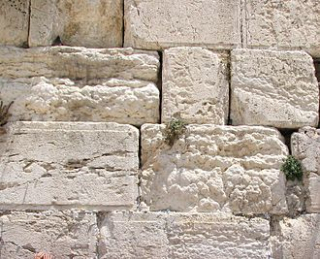 Sunday will be the 17th of the lunar month of Tamuz, the day when we enter the period known as the Three Weeks. I haven't had the spaciousness to write something new about the spiritual journey of this season this year, so here are two posts from previous years that I hope will still resonate.
Sunday will be the 17th of the lunar month of Tamuz, the day when we enter the period known as the Three Weeks. I haven't had the spaciousness to write something new about the spiritual journey of this season this year, so here are two posts from previous years that I hope will still resonate.
The first one is a post about moadim -- "festivals" or "appointed-times" -- of closeness to our Source, and moadim of distance from our Source. Times when God feels near, and times when God feels far away. That language comes from R' Shlomo Wolbe, known as the Alei Shur:
...In the Alei Shur's language, [the Three Weeks] are a moed of distance. They're balanced by the three weeks from Rosh Hashanah to Shemini Atzeret, a moed of closeness and drawing-near. Our calendar gives us three bitter weeks, and three sweet ones... and we need to experience them both. The soul gets "out of whack" otherwise. It's not healthy to marinate only in sorrow all year long, or to allow ourselves only to feel joy all year long. Both of those extremes are spiritually damaging. We need the both / and...
Read the whole post here: Days of closeness, days when God feels far away (2017).
And the second is a post about how the Three Weeks lead us to Tisha b'Av, which in turn is our springboard toward the High Holidays:
...There is a deep wisdom in the way the Jewish calendar unfolds. Our festivals and fast days are waypoints along the journey we travel each year. 17 Tamuz marks the beginning of the descent toward Tisha b'Av. At Tisha b'Av, we mark the beginning of the ascent toward the Days of Awe. // In Hasidic tradition there's the idea that often in order to rise, one first has to fall. Yeridah tzorech aliyah: one has to go down in order to be able to go up. Descent for the sake of ascent...
Read the whole post here: The fast of Tamuz (2014).
May we all find the inner resources we need to do the spiritual work of this season anew this year, and may our inner work impel us in turn to the outer work of creating justice in the world.
(Local folks: here's a save-the-date for my synagogue's observance of Tisha b'Av on July 21. All are welcome.)

June 20, 2018
#FamiliesBelongTogether, and what we can do
This is the note I wrote to send to my synagogue community this week. I'm sharing it here in case it also speaks to those who are not part of my local community but are part of my broader online community.
Many of you who have spoken with me this week have described your despair at current policy of stripping children from parents in order to deter immigration. You've spoken to me about your shock and heartbreak, about the emotional and spiritual impact of that news recording of children crying out for parents they may never see again, about the known traumatic impacts of separating young children from their caregivers.
Recent public discourse has included the suggestion that immigrants are "infesting" our country -- language which should deeply trouble us as Jews: it's the language the Nazi party used to justify what we now know as the Holocaust, and it's also the language Pharaoh used in Torah to describe our spiritual ancestors before setting the enslavement of the Israelites in motion. I know that many of you are troubled by this language too.
Like many of you, I am descended from immigrants who came here seeking asylum from state-sponsored persecution, which gives me an extra sense of connection with today's refugees. Like many of you, I have been gutted to imagine what those children are going through -- and to imagine the anguish their parents now face. Like many of you, I have felt sometimes paralyzed by the enormity of the injustice currently on display.
I am writing to you today to urge you not to give in to that paralysis or to its psycho-spiritual sibling despair. The need is too great. The work of creating a more just world is work in which all of us are obligated as human beings and as Jews. The call to "love the stranger, for [we] were strangers in the land of Egypt" is repeated in Torah no fewer than 36 times. Separating parents from children is the very opposite of showing love.
The ADL recently sent Jeff Sessions a letter, co-signed by 26 American Jewish organizations, arguing that taking children away from parents is unconscionable and that as Jews we understand the plight of immigrants fleeing danger and seeking asylum. On this, every branch of Judaism -- the Reform movement, the Conservative movement, the Reconstructing Judaism movement, and the Orthodox movement --- is in agreement.
Bend the Arc, a Jewish organization that works toward creating a more just world, has established a petition declaring a state of moral emergency. As of this writing, more than 14,000 people have signed it. Here's a secular petition as well. Signing a petition doesn't "do" much, but it can break the personal sense of powerlessness. Reaching out to elected officials is another small act that can begin to create change.
There is a custom of giving tzedakah before Shabbat in order to prime the pump for blessing to flow into the world over Shabbes and in the week to come. My tzedakah donation this week will go to the Refugee and Immigrant Center for Education and Legal Services (RAICES), a Texas-based nonprofit organization dedicated to providing immigrant families and refugees (including children) with affordable legal assistance.
Another possible place to direct your tzedakah this week is the Young Center for Immigrant Children’s Rights, which advocates for the safety and well-being of unaccompanied kids arriving in the United States. The organization recently announced a project specifically dedicated to helping children separated from their parents at the border. You can learn more about the program's efforts and how to donate here.
I believe that as human beings and as Jews we are called to speak and work and act against injustice wherever it arises. Separating parents from children is injustice. Please do what you can to encourage our government to end this inhumane policy now.
And please take care of yourself emotionally and spiritually as you work to better the world. For some of us that means taking a Shabbat respite from the news, or entering into spiritual practice to replenish our hearts and souls for the work to come. Creating a more just world is fundamental to who we are as Jews -- and it's work that calls us also to self-care, so that we can be here to keep doing the work in all the tomorrows to come.
Blessings to all --
Rabbi Rachel
Cross-posted to my From the Rabbi blog.

June 18, 2018
When words fail
I keep trying to write something about the current state of affairs in my country and being too daunted to begin. My words fail me. What wisdom can I possibly offer about migrant children torn from their parents and held in cages? All I have is heartbreak.
But the fact that I am stunned and horrified and sickened by what's happening in my nation is no excuse for my silence. If I can't find words of my own, the least I can do is point to words by others. Here are five tweets I've signal-boosted in recent days:
1. So I’m just going to start a thread of all the faith groups/faith leaders condemning either the Trump admin’s zero tolerance policy that separates families (and/or asylum change), Sessions’ argument that the Bible supports its enforcement, or both.
Here are a few.
— Jack Jenkins (@jackmjenkins) June 15, 2018
When crying children are taken from their parents’ arms, the American Jewish community must not remain silent. We declare: Not here. Not now. Not in our name. This is a state of moral emergency. #FamiliesBelongTogether https://t.co/2IfnoO5h9Q
— Rabbi Sara Zober
Evening sky
 I could go outside and watch the sky change in the wintertime, but I rarely do.
I could go outside and watch the sky change in the wintertime, but I rarely do.
Sunset is early in winter, and the air is too cold for my comfort most of the time, and my mirpesset fills up with snow and I can't open the door until that snow melts in the spring.
But in summer my balcony is one of my favorite places to be, and one of my favorite ways to spend evening time: gazing at the always-perfect and always-changing sky.
On the one hand sky-gazing can feel frivolous. There's so much that needs doing. On the micro scale there are household chores; on the macro scale there's the badly broken world.
But it's exactly because the work is endless that taking a pause from that work is so important. It's the same principle as taking a Shabbat: ideally it restores me for the week.
And even when I don't daven a full ma'ariv service I can pause to notice, and bless the One Who evens the evenings, mixing the changing colors of the evening sky.

June 14, 2018
On holding a printer's proof of Bayit's "Beside Still Waters"
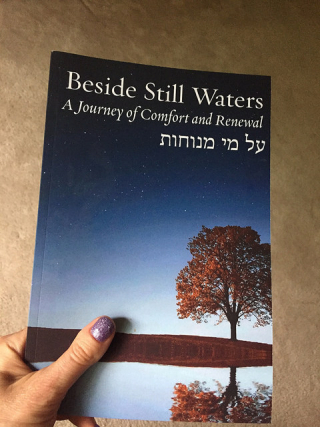 One of the enduring mysteries of publishing, for me, is how different a manuscript feels once it's typeset and bound.
One of the enduring mysteries of publishing, for me, is how different a manuscript feels once it's typeset and bound.
This shouldn't be news to me. I've been privileged to work with several fine publishers, from Pecan Grove Press (who published my first chapbook in 1995) to Phoenicia Publishing (who published 70 faces: Torah poems and Waiting to Unfold) to Ben Yehuda Press (who published Open My Lips and Texts to the Holy.) And yet every time I hold a new printer's proof in my hands, I'm always awestruck by how real the volume feels, and how different that is from a PDF on my computer screen.
The volume in question this time is a printer's proof of the first third of Beside Still Waters: A Journey of Comfort and Renewal, the volume for mourners being co-published by Bayit: Your Jewish Home and Ben Yehuda Press. This book contains poems, prayers, readings, and meditations from some 39 people -- including some of the poets, liturgists, and rabbis I most admire. (There's a list of contributors on the book's webpage.) That they entrusted us with publishing their work is humbling.
And I think this book will meet a real pastoral need, and that's a humbling responsibility, too. Beside Still Waters is something that I need as a congregational rabbi who ministers to people throughout the mourner's journey. It's something that I need as a person who will someday walk the mourner's path myself. And I think it will meet the needs of a lot of people, across and beyond the denominational spectrum, in synagogues and chavurot, hospitals and nursing homes and funeral homes.
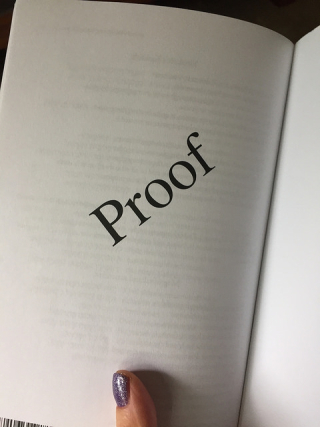 Mourning is at once deeply personal and -- at least in Jewish tradition -- also communal. The whole custom of shiva minyanim and kaddish is designed to embed a mourner in community. (Many meaningful books have been written about how saying kaddish daily for a year changed someone's sense of self, God, and community.) Beside Still Waters is designed to help individual mourners on the mourner's path, but even more than that, it's meant to be used b'tzibbur, in community settings.
Mourning is at once deeply personal and -- at least in Jewish tradition -- also communal. The whole custom of shiva minyanim and kaddish is designed to embed a mourner in community. (Many meaningful books have been written about how saying kaddish daily for a year changed someone's sense of self, God, and community.) Beside Still Waters is designed to help individual mourners on the mourner's path, but even more than that, it's meant to be used b'tzibbur, in community settings.
There are still several stops remaining on the journey toward publication. Based on this partial proof we've made definitive choices about fonts and typesetting style. Now the other two-thirds of the book needs to be typeset and designed. There's proofreading and copyediting work to be done, in English and in the transliteration and in the Hebrew (where sometimes nekudot, vowel dots and markings, get subtly shifted as an artifact of file transfer.)
But seeing this partial proof makes the book feel real. I can imagine sharing the "Healing of Body, Healing of Spirit" and "Before Death" sections with someone who is dying. I can imagine leading a shiva minyan with the liturgy we've collected here. I can imagine using the book for yahrzeit and yizkor and times of remembrance. I can imagine this book going out into the world and making a difference in people's lives... and that gives me the energy I need to keep the behind-the-scenes work going.
I'm endlessly grateful to our publishing partner Larry Yudelson at Ben Yehuda Press, and to my hevre at Bayit, and to everyone who contributed their work to this book. I can't wait to bring it into the world and share it with all of you.
You can pre-order Beside Still Waters on the Ben Yehuda Press website. If you're interested in a bulk order for your community, let me know -- discounts are available.

Rachel Barenblat's Blog
- Rachel Barenblat's profile
- 6 followers


